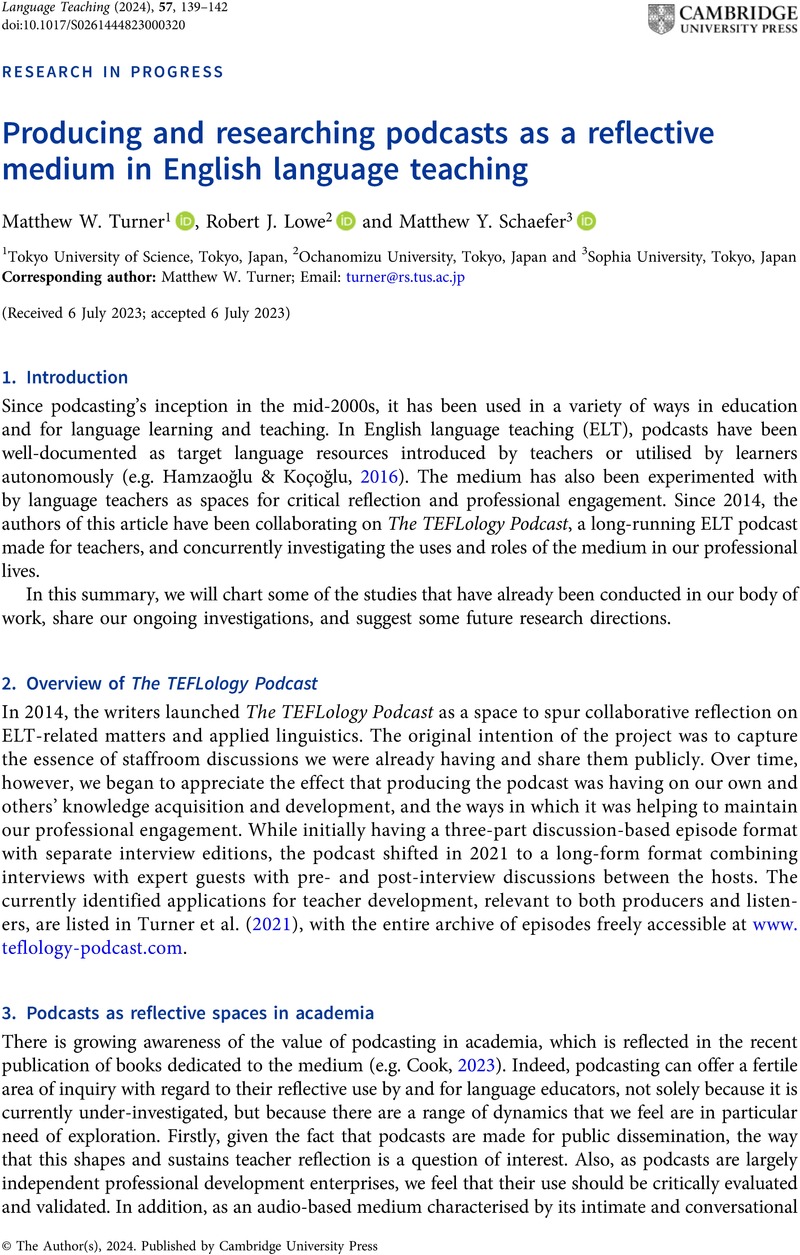No CrossRef data available.
Article contents
Producing and researching podcasts as a reflective medium in English language teaching
Published online by Cambridge University Press: 09 January 2024
Abstract
An abstract is not available for this content so a preview has been provided. Please use the Get access link above for information on how to access this content.

- Type
- Research in Progress
- Information
- Copyright
- Copyright © The Author(s), 2024. Published by Cambridge University Press
References
Chang, H., Ngunjiri, F. W., & Hernandez, K.-A. C. (2013). Collaborative autoethnography. Left Coast Press.Google Scholar
Cook, I. M. (2023). Scholarly podcasting: Why, what, how? (1st ed.). Routledge. doi:10.4324/9781003006596CrossRefGoogle Scholar
Hamzaoğlu, H., & Koçoğlu, Z. (2016). The application of podcasting as an instructional tool to improve Turkish EFL learners’ speaking anxiety. Educational Media International, 53(4), 313–326. doi:10.1080/09523987.2016.1254889CrossRefGoogle Scholar
Kiely, R., & Davis, M. (2010). From transmission to transformation: Teacher learning in English for speakers of other languages. Language Teaching Research, 14(3), 277–295. doi:10.1177/1362168810365241CrossRefGoogle Scholar
Lowe, R. J., Schaefer, M. Y., & Turner, M. W. (2017). Podcasting and professional development: A guide for English language teachers. The Round.Google Scholar
Lowe, R. J., Turner, M. W., & Schaefer, M. Y. (2021). Dialogic research engagement through podcasting as a step towards action research: A collaborative autoethnography of teachers exploring their knowledge and practice. Educational Action Research, 29(3), 429–446. doi:10.1080/09650792.2021.1908905CrossRefGoogle Scholar
Lundström, M., & Lundström, T. P. (2021). Podcast ethnography. International Journal of Social Research Methodology, 24(3), 289–299. doi:10.1080/13645579.2020.1778221CrossRefGoogle Scholar
Norris, J., & Sawyer, R. (2012). Toward a dialogic methodology. In Norris, J., Sawyer, R., & Lund, D. E. (Eds.), Duoethnography: Dialogic methods for social, health, and educational research (pp. 9–40). Left Coast Press.Google Scholar
Schaefer, M. Y., & Lowe, R. J. (in press). Critical co-presenterships: Podcasting as reflective practice. In Verla Uchida, A., & Roloff Rothman, J. (Eds.), Cultivating critical friendships through reflective practice: Cases from Japan. Candlin & Mynard ePublishing.Google Scholar
Turner, M. W., Schaefer, M. Y., & Lowe, R. J. (2021). Teacher development through podcast engagement. In Clements, P., Derrah, R., & Ferguson, P. (Eds.), Communities of teachers & learners (pp. 53–60). JALT. doi:10.37546/JALTPCP2020-07Google Scholar
Turner, M. W., Schaefer, M. Y., Lowe, R. J., Alizadeh, M., Bao, D., & O'Loughlin, J. B. (2019). Diversity through interaction: An interview forum. In Clements, P., Krause, A., & Bennett, P. (Eds.), Diversity and inclusion (pp. 57–66). JALT. doi:10.37546/JALTPCP2018-08Google Scholar
Turner, M. W., Schaefer, M. Y., & Lowe, R. J. (2023). A podcast format for expanding knowledge through engaging with expertise. In Ferguson, P., Lacy, B., & Derrah, R. (Eds.), Learning from students, educating teachers—Research and practice. JALT.Google Scholar
Wachob, P. (2011). Critical friendship circles: The cultural challenge of cool feedback. Professional Development in Education, 37(3), 353–372. doi: 10.1080/19415257.2010.537064CrossRefGoogle Scholar





